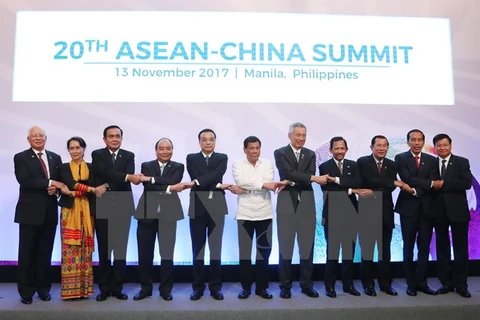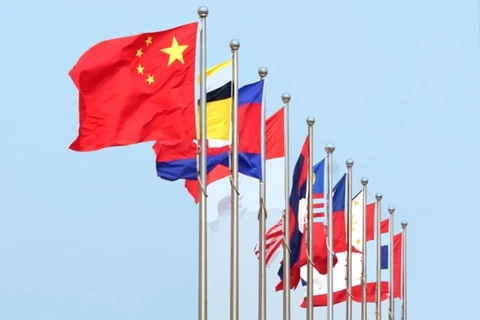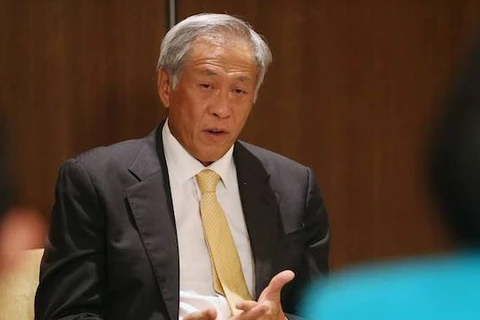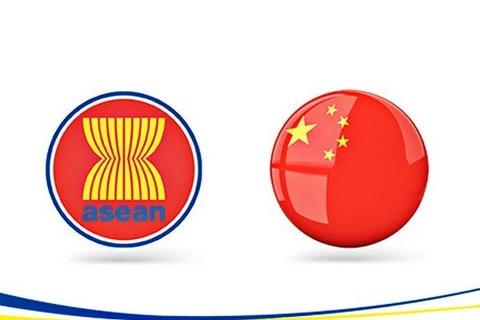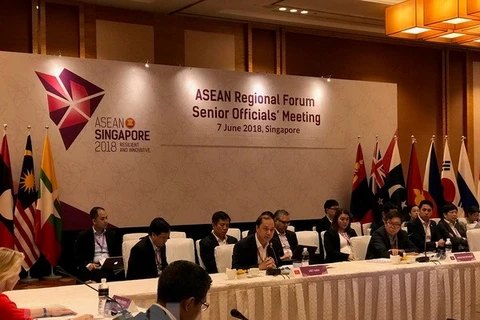 Deputy Foreign Minister Nguyen Quoc Dung, head of the Vietnamese delegation at the 24th ASEAN-China Senior Officials' Consultation in Singapore on June 8 (Photo: VNA)
Deputy Foreign Minister Nguyen Quoc Dung, head of the Vietnamese delegation at the 24th ASEAN-China Senior Officials' Consultation in Singapore on June 8 (Photo: VNA) Singapore (VNA) – Senior officials of the ASEAN countries and China held their 24th consultation (ACSOC-24) in Singapore on June 8 to review bilateral relations and discuss measures to reinforce the cooperation and strategic partnership between ASEAN and China.
Deputy Foreign Minister Nguyen Quoc Dung led a Vietnamese delegation to the consultation, an annual event at the deputy foreign ministerial level within the framework of ASEAN-China dialogue relations.
The countries applauded the outcomes of the two sides’ strategic partnership and comprehensive cooperation, particularly in implementing the ASEAN-China Plan of Action 2016-2020. China has continually been the top trade partner of ASEAN over the last nine years and the fourth biggest FDI investor in the bloc.
China affirmed that it attaches importance to cooperation with ASEAN, stressing its support for the grouping’s central role in the regional architecture. The country wants ASEAN to develop dynamically and pledges to continue assisting the bloc in building its community, boost connectivity, and narrow development gap.
Meanwhile, ASEAN officials emphasised the importance of the ASEAN-China strategic partnership to regional peace, stability and prosperity. They said their countries welcome activities marking the 15th founding anniversary of this strategic partnership, including a commemorative summit in late 2018.
The two sides said they will further consolidate and develop the strategic partnership on the basis of mutual benefits, and enhance understanding and trust. They agreed to gather resources to effectively implement the ASEAN-China Plan of Action 2016-2020, soon complete the ratification of the protocol on upgrading the ASEAN-China Free Trade Agreement, and facilitate trade and investment so as to boost bilateral trade to 1 trillion USD and investment to 150 billion USD by 2020.
ASEAN and China will continue expanding cooperation to new fields like digital economy, e-commerce, digital connectivity, and smart city building. They will also step up the exchange of people, youth and scholars so as to raise two-way tourist arrivals to 30 million by 2020. Cooperation will also be strengthened to solve non-traditional and trans-national security problems like cyber-crime, climate change, epidemics, and disaster management, and increase coordination at international and regional multilateral forums.
At the ACSOC-24, officials exchanged views on the regional and world situation, including the Korean Peninsula situation and emerging challenges such as cyber security, terrorism, violent extremism, climate change, and disaster aid.
Regarding the East Sea issue, the participating countries underlined the significance of peace, stability, security, safety and freedom of navigation and aviation in the waters. ASEAN called on relevant parties to exercise restraint, not complicate the situation or raise tension, and resolve disputes by peaceful measures on the basis of international law, including the 1982 United Nations Convention on the Law of the Sea (1982 UNCLOS).
The countries agreed on the need to fully implement the Declaration on the Conduct of Parties (DOC) in the East Sea and soon achieve a meaningful and effective Code of Conduct (COC) in the waters.
Addressing the meeting, Deputy FM Nguyen Quoc Dung highly valued China’s commitment to supporting ASEAN’s central role and helping the bloc to build its community, enhance connectivity and narrow development gap.
He urged both sides to work closely together to implement their leaders’ decisions and actively realise the ASEAN-China Plan of Action 2016-2020 with concrete and practical cooperation projects.
He also welcomed their active preparation for the activities marking 15 years of the ASEAN-China strategic partnership, asking for close coordination to ensure the success of the commemorative summit in late 2018.
Talking about the East Sea situation, Dung also voiced concerns about the recent happenings in the waters. He underscored the importance of exercising restraint, avoiding actions to complicate the situation, promoting dialogue and cooperation, and peacefully settling disputes on the basis on international law and the 1982 UNCLOS. He also called for full implementation of the DOC and creation of a favourable environment for the COC negotiation.-VNA
VNA
